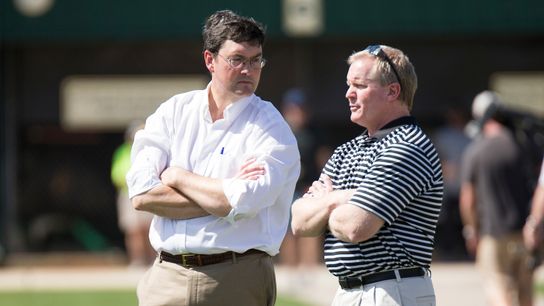The Pirates are in a free-fall, losing 23 of 27 since the All-Star break and dropping to 20 games under .500 at 48-68. It's the kind of collapse that usually costs jobs.
Speaking on his weekly radio show on 93.7 The Fan Sunday before the team's series finale against the Cardinals in St. Louis, Neal Huntington offered the following:
"Obviously, it's been one of the toughest stretches I can remember being a part of," Huntington said. "Even the 105-loss season [2010], it didn't feel like we had a stretch like this and when you're expecting to win and believe you can win and don't, then it is much harder ... It's been challenging, and you certainly want to be the Indians, who've got the best record in the American League, and the Mets, who've been on fire here. You certainly want to be in those teams' situations."
That's because losing this much is new for the Pirates. It's historic. And it comes after a somewhat encouraging start to the season, making the team's current status all the more dramatic.
The Pirates began the 2019 campaign at 10-6, capturing first place in the NL Central briefly before stumbling down the standings. The team, however, corrected course just before the All-Star break, climbing to within two-and-a-half games of the divisional lead and causing many to think the team would "buy" at the trade deadline to make a real run at the postseason.
Then, yeah ... All those stats at the top of this piece happened. Currently, the Pirates have lost seven straight, with a sweep against the Cardinals looming if they can't snap out of it.
"Twenty four of the 27 games were against teams over .500, against teams that are fighting for playoff spots, and those are the teams you need to play well to beat when you're a good team," Huntington said. "When you're a struggling team, seven of the 23 losses are one-run, 13 of the 23 losses are one to two plays difference where we make a play and it's a different outcome or the other team makes a big pitch or gets a big hit and we weren't able to ... We've been through this before, the calls for the firing in 2011 when we were competitive until late July, 2012, when we were competitive, I think, into August and then faded and had some tough finishes to those seasons and obviously turned things around in '13, '14 and '15, but not enough to win a World Series."
That all sounds like an excuse from Huntington, but he followed up with Greg Brown, saying he understands the situation and he admits something needs to happen.
"I think we recognize that changes are needed and emotional decisions are rarely good decisions, whether things are going really well and you make an emotional decision because they're going well or things are not going well and you make an emotional decision," Huntington said. "We recognize that, as we evaluate this in the big picture and we look to take into account as much as we can, as much relevant information as we can."
Then, Huntington doubled down with the most direct shot of accountability both for himself and for the team.
"We recognize that the players on the field maybe don't have enough talent because of the players that I put on that field. Maybe we're not teaching them the way we can or need to. Maybe they're just simply not executing. So it's a combination of the players I put on the field, the work we're doing with them and then the work the players are getting done. And we recognize that our decision-making process needs to go through a thorough review."
Then came the questions.
"How did we get here? How did we go from two-and-a-half games out at the All-Star break to 4-23 in a really tough stretch of games, despite feeling like many of those games we could have or should have won?"
It's your job to figure that out, Mr. Huntington — for now.


